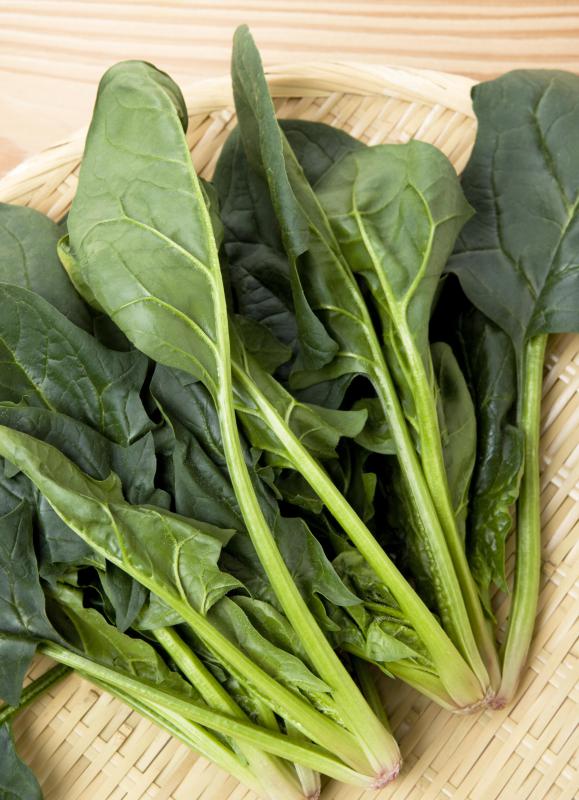At TheHealthBoard, we're committed to delivering accurate, trustworthy information. Our expert-authored content is rigorously fact-checked and sourced from credible authorities. Discover how we uphold the highest standards in providing you with reliable knowledge.
What is Folic Acid Deficiency?
Folic acid deficiency is a medical condition which occurs when people are not consuming enough folic acid, or they are unable to absorb this essential nutrient. If the deficiency persists, it can lead to anemia. Folic acid deficiencies are linked with a number of health problems, and for this reason, many nations mandate folic acid supplementation of foods like cereals. Supplementation has radically reduced the incidence of deficiency in many regions of the world.
Folic acid, also known as folate or vitamin B9, can be found in many foods, including fruits, vegetables, and meats. In the body, it helps with the production of new blood cells, and it also plays a role in RNA and DNA replication. One of the immediate consequences of a folic acid deficiency is a decline in red blood cell production, leading to anemia. Lack of the nutrient can also contribute to the development of some cancers, and increase the risk of arteriosclerosis. In pregnant women, a folic acid deficiency can lead to birth defects.

A folic acid deficiency can be diagnosed by drawing blood. If a patient is deficient, the doctor will conduct an interview to gather information about the patient's history. If the patient has an inadequate diet or drinks a great deal of alcohol, it may be possible to correct the issue with folic acid supplements and a change in diet. In cases where the patient appears to be eating well, it may be necessary to conduct tests to see if the body is having difficulty absorbing folic acid.

Most people get the folic acid they need from daily consumption of fruits and vegetables. Because folic acid is water soluble, it is expressed by the body on a regular basis, which makes it critical to absorb some every day. Although the body keeps small amounts in reserve, these reserves can quickly be depleted. Pregnant women are often encouraged to take folic acid supplements to ensure that their fetuses will be provided with enough folic acid to develop normally.

Patients with a folic acid deficiency can experience symptoms like fatigue, difficulty concentrating, and headaches. It is difficult to overdose on folic acid, because the body expresses excess folic acid when it can't use it. However, taking a lot of folic acid can sometimes conceal the signs of a deficiency in B12, another essential vitamin. B12 deficiencies can cause brain damage, making them critical to identify and correct. Excess folic acid can also impact malaria treatment.
AS FEATURED ON:
AS FEATURED ON:













Discussion Comments
@sinbad - You are in luck, there are some very easy foods rich in folic acid you can add to your diet so that you can help yourself avoid becoming anemic.
Some of the foods I have heard of (not in any particular order) are: chickpeas (they are in hummus or I add chickpeas to my salad they really help a salad fill you up), black eyed peas (texas caviar, anyone?), raw spinach, cooked okra (I suggest adding these to your veggie soups as opposed to eating alone - unless of course you are going for fried okra), and orange juice.
It sounds that folic acid is mostly recommended in supplement form, but I like to try and eat natural foods with nutrients to supplement my supplements, especially as @MissDaphne noted this is a great practice for women in the child bearing stage of life.
So what are some foods that contain folic acid so that I can prevent not only disruptions in baby's development but also so I can avoid the folic acid deficiency of anemia?
I've heard that, too, about it being important to start folic acid before you get pregnant. But my doctor told me there was enough folic acid in regular vitamins (I was taking an orange women's vitamin every day) to get me through the first few weeks. After that, she said I would need not just more folic acid, but more iron, vitamin C, etc.
I also heard, though, that the *majority* of pregnancies in this country are unplanned! (Pretty shocking statistic in a country with widely available, effective birth control.) Because of that, a lot of people think it's a good idea for every women of childbearing age to take a vitamin with folic acid every day just in case.
I'm not sure how I feel about that. On the one hand, yes, of course we want to prevent neural tube defects. On the other hand, it seems patronizing to assume that women are all accidental baby factories!
These days, most doctors will actually advice a woman to start taking folic acid *before* pregnancy. Mine told me to start taking prenatal vitamins three months before I planned to start trying to get pregnant. That way, you make sure there's plenty of folic acid in your system.
Apparently, the time when a folic acid deficiency is most dangerous to your baby is in the first few weeks of pregnancy - before you even know you're pregnant. That's when the baby's spinal cord is fusing. (Folic acid deficiency can cause neural tube defects like spina bifida). So if you wait to start taking vitamins until you get that positive pregnancy test, it could be too late.
Post your comments